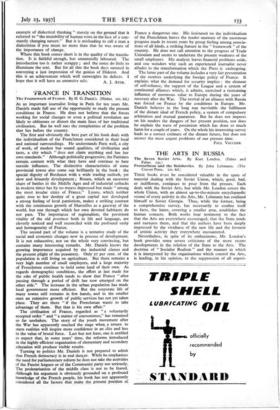'FRANCE IN TRANSITION
The Framework of France. By H. G. Danie:s. (Nisbet. los. 6d.) As an important journalist living in Paris for ten years Mr. Daniels made full use of the opportunity to study the present conditions in France. He does not believe that the forces working for social changes or even a political revolution are likely to obliterate or distort the main lines of her traditional civilisation. But he well sees the Complexities of the problem that lies before the country. The first and obviously the best part of his book deals with the individualism of the Frenchmen considered in their local and national surroundings. He understands Paris well, a city
of work, of modest but- sound -,qualities,. of civilisation and taste, a city which " does not claim anything and has her
own standards." - Although politically progressive, the Parisians remain., content with what they have and continue t6 hate outside influence. The distinctive characteristics . of some provincial towns also come out brilliantly in the book :.the special dignity of Bordeaux with a wide trading outlook, yet slow and leisurely dev.elopment; Rouen, which an excessive
share of battles in the Middle Ages and of industrial setbacks in modern times has by no means depressed but made " among the most insular cities- of France." - Lyons, which neither quite rose to her destiny of a great capital nor developed a strong feeling of local patriotism, makes a striking contrast with the continuous growth of Marseilles as a gateway of the
world, .but one through which her own devoted habitants do not pass. The importance of regionalism, the persistent vitality of the old provinces both in life and language, are cleverly noticed and well reconciled with the profound unity and homogeneity of France. The second pert of the volume is a tentative study of the social and economic changes now in process of development. It is not exhaustive, nor on the whole very convincing, but
contains many interesting remarks. Mr. Daniels knows the growing importance acquired by the industrial classes and
the present plight of the peasantry. Only 27 per cent. of the population is still living on agriculture. But there remains a very high number of small employers, and a large majority of Frenchmen continue to hold some land of their own. As regards demographic conditions, the effort at last- made for the sake of public health tends to show that France " after passing through a period of drift has now emerged on the
other side." The increase in the urban population has made local government more efficient. But the corporate life of many towns still remains in few hands, and in the smaller ones an extensive growth of public services has not yet taken place. They are there " if the Frenchman wants to take advantage of them. But that is his own affair." The civilisation of France, regarded as " a voluntarily accepted order " and " a matter of convenience," has remained
so far unshaken. The story of the youth movement after
the War has apparently reached the stage whetk, a return to stern realities will inspire more confidence in an. dire and less
in the value of brutal force. Last but not least, one is entitled to expect that, in some years' time, the reforms introduced in the highly efficient organisation of elementary and secondary education will produce visible results.
Turning to politics Mr. Daniels is not prepared to admit that FrenCh democracy is in real danger. While he emphasises, the need for parliamentary reform he does not take the activities of the Fascist leagues or of the Communist party too seriously. The proletarisation of -the middle class is not to be. feared. Although his argument is obviously grounded on a profound knowledge of-the French people, his book has not apparently considered all the factors that make the present position a. France a dangerous one.. -His insistence On the individualism of the Frenchmen leaves the reader unaware of the enormous progress made in recent years by group feeling among associa- tions of all- kinds, a striking feature in the " framework " of the country. He does not call attention to the progress of Trade Unionism and seems to underrate the present weakness of the small employers. His analysis leaves financial problems aside, and one wonders why such an experienced journalist never alludes to the transformation which the Press is undergoing. , The latter part of the volume includes a very fair presentation of the motives underlying the foreign policy of France. It explains what the demand for security implies : the element of self-reliance, the support of the League and a system of continental alliances which, it admits, exercised a restraining influence of enormous value, to Europe during the years of recovery after the War. -The revival of an alliance with Russia was forced on France by the conditions in Europe. Mr. Daniels believes in the long run inevitable the fulfilment of the distant ideal of French policy, a system of compulsory arbitration and mutual guarantee. But he does not impress on his readers the dangers of her present position, nor does he , explain the wave of pessimism which has done so much harm for a couple of years. On the whole his interesting survey leads to a correct estimate of the distant future, but does not answer the most urgent problems of our present time.
PAUL VAUCHER.






























































 Previous page
Previous page